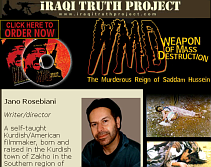2006年VOA标准英语-Kurdish Filmmaker Details Anfal Atrocities(在线收听)
By Brian Padden
Irbil, Iraq
26 August 2006
The genocide trial of Saddam Hussein for a military operation against Iraqi Kurds two decades ago, has brought the Anfal campaign back into the headlines. Prosecutors say 180,000 Kurds were killed and thousands of villages wiped out. Kurdish-American filmmaker Jano Rosebiani has sought to convey the magnitude of the devastation in a series of documentary films, allowing victims and survivors to tell their own stories.
-------
 Screenshot from Iraqi Truth Project homepage |
||
Rosebiani is a Kurdish-American filmmaker, whose purpose in making Mass Graves was to bring to light the atrocities that occurred during the rule of Saddam Hussein.
"I felt like no one was actually doing any films or documentaries in detail, nothing deep enough to really get the viewer outside of the region to really understand the tragedy that took place here, or the extent of it, the fact that we can actually call it genocide," he said.
With financial support from the U.S. government, Rosebiani produced three documentaries, Mass Graves, Chemical Ali and Weapon of Mass Destruction.
All three films detail atrocities committed by Saddam Hussein's regime through eyewitness accounts. People tell of seeing their loved one tortured and killed in front of them, of being forced to flee their homes, of surviving chemical attacks and of the sense of isolation.
One man said he was able to escape to a Turkish refugee camp, but officials there refused to acknowledge that he was a victim of a chemical attack.
"We would tell the Turks about the chemicals," he said. "They would tell us to shut our mouths. They would say, 'you have been burned by fire.'"
Rosebiani was also given access to video shot by the Iraqi military, documenting torture and killings. Rosebiani says the films are hard to watch.
"It was really a nightmare to go through it," he added. "I would look at my [the] babies, and start thinking of the stories they were telling me about, what was happening to their babies. You know, sometimes I feel like I would go mad."
Now that Saddam Hussein and six of his former military commanders are on trial for genocide against the Kurds, there is a sense of satisfaction for Rosebiani. He says his films set the stage for the current trial by making the case against Saddam in the court of world opinion.